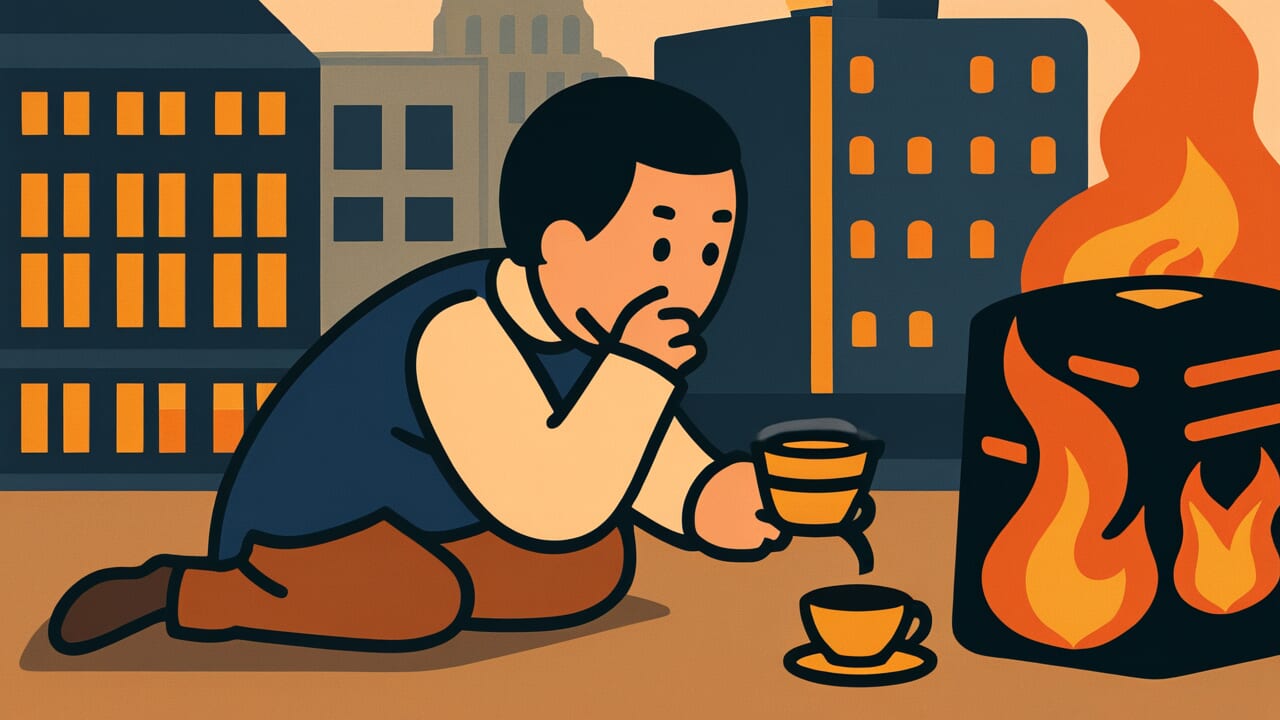How to Read “Even if the neighbor’s house is on fire, first have a smoke”
Tonari wa kaji demo mazu ippuku
Meaning of “Even if the neighbor’s house is on fire, first have a smoke”
This proverb teaches that you should stay calm and composed no matter how urgent the situation is.
Even when your neighbor’s house is on fire, you should take a moment to settle your mind before rushing into action. This extreme example emphasizes how important calmness really is.
During emergencies, people instinctively panic. But that’s exactly when you need to stop and assess the situation carefully.
When you act in a hurry, you often make poor decisions. This can make things worse instead of better.
The proverb understands this human tendency. It teaches us to consciously maintain our composure.
Today, we use this saying when work troubles or unexpected problems arise. Instead of reacting immediately, take a deep breath and organize your thoughts first.
Calm judgment during emergencies leads to the best outcomes. This wisdom transcends time and remains valuable today.
Origin and Etymology
No clear historical record shows when this proverb first appeared. However, we can understand its origins by examining the words themselves.
The term “ippuku” originally meant drinking tea or smoking tobacco. During the Edo period, tobacco became widespread among common people.
Taking a smoke break became a symbol of daily rest. People would pause their busy work to relax with tobacco or tea.
What makes this proverb interesting is its extreme example of a neighbor’s house on fire. Edo was famous for frequent fires.
People said “fires and fights are the flowers of Edo.” Wooden houses stood close together, so a neighbor’s fire could easily spread to your own home.
This was truly a life-threatening emergency. Yet the proverb says to take a smoke break even then.
This teaching shows that people learned from experience how dangerous panic can be. Many witnessed others getting trapped while rushing to escape or getting hurt trying to save valuables.
From such experiences, this practical life wisdom was born.
Usage Examples
- A major complaint came in, but even if the neighbor’s house is on fire, first have a smoke—let’s organize the situation first
- I understand you’re worried about the system error, but even if the neighbor’s house is on fire, first have a smoke—let’s calmly search for the cause
Universal Wisdom
This proverb contains deep insight into panic, a phenomenon humans naturally experience during emergencies.
When we face a crisis, our survival instincts activate. Our bodies react before our minds can think. But these instinctive reactions don’t always produce the best results.
Our ancestors learned the dangers of panic through countless experiences. People died rushing back into burning buildings for valuables.
Others made wrong decisions in their haste and made situations worse. Each time people witnessed such cases, they recognized the value of staying calm.
What’s interesting is that this proverb doesn’t say “stay calm” directly. Instead, it suggests a specific action: “have a smoke.”
Rather than giving abstract instructions about calming your mind, it recommends an actual physical action. This creates thinking time in a concrete way.
Humans are emotional creatures. We know logically that we should stay calm, but it’s difficult during actual emergencies.
That’s why we need actions that consciously create a pause. This proverb understands human weakness and shows a practical way to overcome it.
This is truly human wisdom at its finest.
When AI Hears This
When emergencies occur, the human sympathetic nervous system activates rapidly. Heart rate increases and vision narrows.
This is called the “fight-or-flight response,” a primitive survival mechanism. However, in this state, blood flow to the prefrontal cortex decreases.
The prefrontal cortex handles calm judgment. In other words, you can’t make smart choices during panic.
Here’s where the neuroscience of “having a smoke” becomes interesting. Smoking with deep breathing or drinking tea stimulates the parasympathetic nervous system.
This calms your heart rate and restores blood flow to the prefrontal cortex. Research shows that groups who took intentional two-minute breaks made 30 percent more accurate decisions than groups who acted immediately.
Even more noteworthy is how this “strategic pause” switches the brain’s information processing mode. During panic, the amygdala runs wild and only instinctive reactions are possible.
But taking a break reboots the prefrontal cortex, allowing you to see the situation from above. You move from simple reactions like “fire, run!” to complex judgments about safe routes and what to take.
This proverb captured the “optimal crisis response protocol” that neuroscience has revealed, expressing it through experiential wisdom.
Lessons for Today
Modern society demands instant responses. People expect quick replies to emails and messages.
When problems arise, pressure builds to handle them immediately. But this proverb offers lessons especially valuable for our times.
When you face unexpected work troubles, receive critical social media comments, or encounter relationship conflicts, stop before reacting immediately.
Take a deep breath, drink some tea, or walk a little. These small pauses can dramatically change your judgment.
In the digital age especially, we often send emotional reactions instantly and later regret them. One breath before pressing send can protect relationships and your reputation.
Calmness isn’t weakness—it’s strength. People who can handle situations without panic are truly reliable.
Having the composure to take a break during emergencies becomes the key to guiding your life in better directions.



Comments